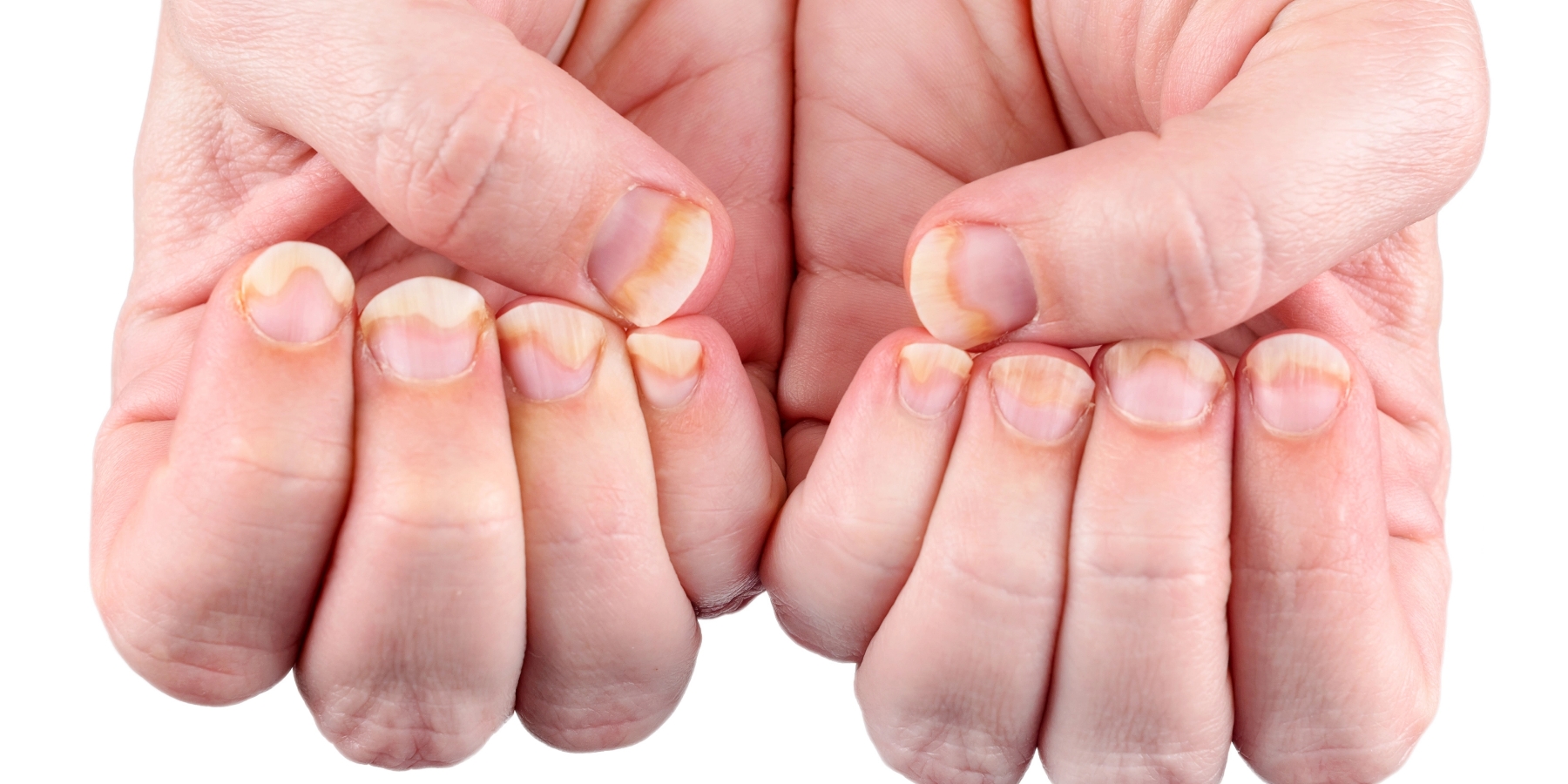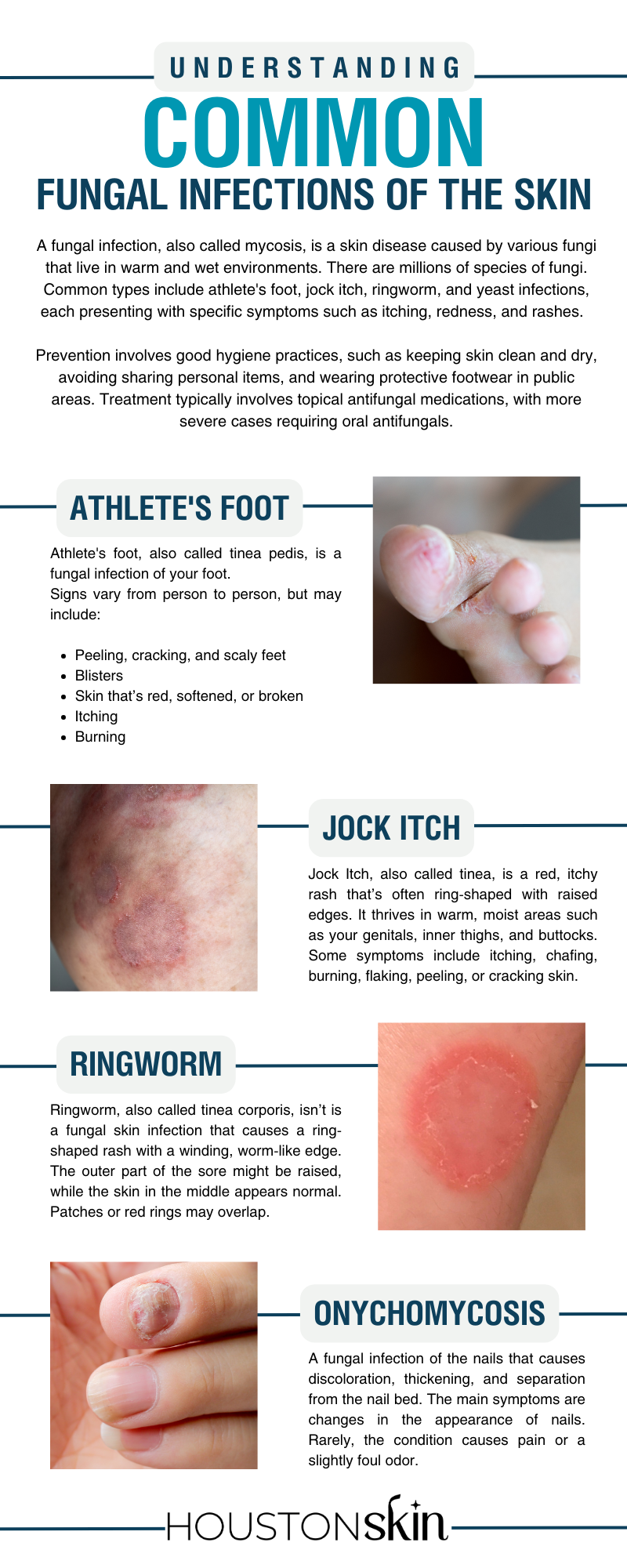
Fungal and bacterial infections can wreak havoc on your skin and nails, causing discomfort, embarrassment, and even pain. From stubborn acne breakouts to unsightly nail discoloration, these infections can significantly impact your confidence and quality of life. At Houston Skin, we’re committed to helping you reclaim healthy, clear skin. Our team of board-certified dermatologists understands the complexities of fungal and bacterial infections and provides skilled diagnosis and treatment to address the root cause and alleviate your symptoms.
Types of Fungal Skin and Nail Infections
Fungal infection can affect your skin and nails in several ways. Some of the most common fungal infections include:
- Athlete’s Foot (Tinea Pedis), which usually begins between the toes.
- Jock Itch (Tinea Cruris), typically centralized around the groin.
- Ringworm (Tinea Corporis), which can cause itchy, circular rashes almost anywhere on the body.
- Nail Fungus (Onychomycosis), usually begins as a white or yellow spot underneath the finger or toenail.

Causes of Fungal Infections
Several factors can increase your risk of a fungal infection. Some of the primary causes include:
- Spending a lot of time in warm, moist environments.
- Direct contact with a person or surface that has a fungus.
- An immune system weakened by illness or by clinical treatment.
- Sharing personal items, such as shoes or a towel.
- Having cuts, burns, or other breaks in the skin.
- Breathing in spores from the soil or dust, common among those who spend a lot of time doing outdoor work.
Symptoms of Fungal Infections
Fungal infections can manifest with a range of different symptoms. Some of the most common indicators of a fungal infection include:
- Itching, burning, redness
- Scaling, flaking, or cracking skin
- Blisters or sores
- Discolored, thickened, or brittle nails
Diagnosis
Your board-certified dermatologist will perform a careful visual examination of your skin, including the infected area, to determine the nature and scope of your infection. In some situations, your doctor may perform a skin scraping, sending a sample to the lab to more accurately assess the type of fungus causing the infection.
Treatment
Treatment options can vary according to the type of fungal infection. A topical antifungal medication, such as a lotion or powder, is sufficient in many cases. For more severe cases, oral medication may be recommended. Nail fungus may also be treated with laser therapy, a safe and effective way of eradicating your fungal infection.
Prevention
There are a number of steps that can help you prevent a fungal infection, including:
- Keep skin clean and dry.
- Wear breathable footwear.
- Change socks regularly.
- Do not share personal items.
- Avoid walking barefoot in public areas.
- Practice good hygiene at gyms and public pools.
Meet The Team
At Houston Skin, our Board-Certified Dermatologist, Dr. Stephen K. Tyring, MD, providers and the skin care team bring a wealth of experience and a passion for healthy skin. With extensive clinical experience and the highest levels of training, our doctors are committed to delivering exceptional care and achieving optimal results for every patient. We prioritize your comfort and safety, promoting a positive and reassuring experience throughout your journey to vibrant skin. We’re honored to be your trusted provider of quality medical dermatology care and your partners in achieving and maintaining your skin’s health.
Feel Good About Your Skin
Ready to unlock your skin’s full potential? Schedule a fungal skin and nail infections treatment consultation at one of our convenient Houston Skin locations today. Our board-certified dermatologists will provide a personalized assessment and recommend the ideal treatments to help you achieve and maintain healthy, vibrant skin. Call now or schedule a consultation online to take the first step towards a more confident, radiant you.

